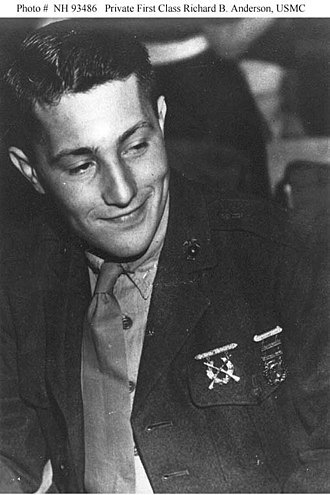Richard Beatty Anderson entered the Marine Corps in July 1942 as a Private First Class (PFC). His battalion (2nd Battalion, 23rd Marines) departed from the US in January 1944 and soon after participated in the invasion of Roi Island, one of the Marshall Islands. It was due to actions during this battle in February 1944 that Anderson was honored with the Medal of Honor. Unfortunately, it was received posthumously as the very act that earned him the award also ended his life.
On February 1, PFC Anderson slipped into a shell crater occupied by three other US soldiers for cover from Japanese troops. Anderson primed a grenade to throw at the enemy, only to have it slip from his fingers and roll deeper into the crater. Knowing that there was insufficient time to retrieve the grenade and throw it before it exploded, Anderson instead chose to minimize the damage it would cause in the crater. By throwing himself on top of the grenade, Anderson spared the lives of the three Marines who were also in the hole. In taking the full impact of the explosion, Anderson showed “personal valor and an exceptional spirit of loyalty in the face of almost certain death” (army.com, Medal of Honor recipients).
Anderson was also awarded the Purple Heart, the Asiatic-Pacific Campaign Medal, and the WWII Victory Medal for his actions in the war.
A Navy destroyer was commissioned under his name in 1945, and the Port Angeles Federal Building was renamed in 2008 the “Richard B. Anderson Federal Building”.
Sources Consulted:








